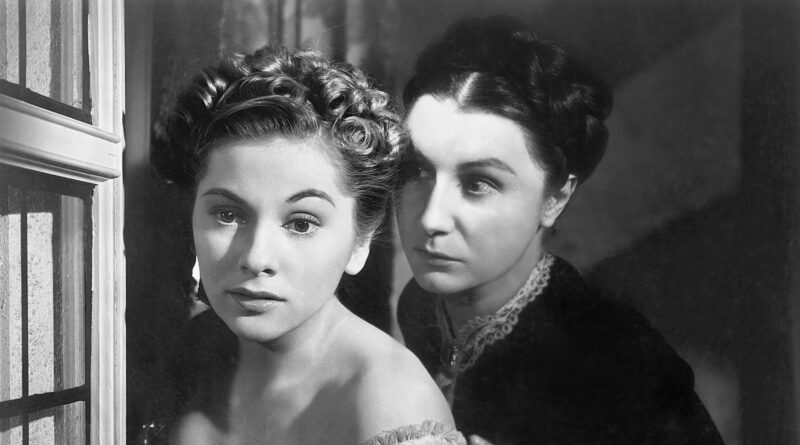Rebecca (1940)
Alfred Hitchcock’s Rebecca is a ghost story, and yet it contains not a single vaporous spirit passing through walls, no sounds of rattling chains or spooky groans echoing down hallways, no bodily possessions or mysterious clues that materialize in agonizing increments. The characters and the sprawling English manor by the sea are haunted by a memory, the memory of a woman who has been dead for a year: Rebecca de Winter. Her name continues to be spoken. Her beauty, unseen by the audience, is very much remembered. Her letterhead, handkerchiefs, bedsheets, and towels, all monogrammed with a huge feminine letter R, are in so many rooms – which is to say, are almost always in sight.
As with any good ghost story, supernatural or not, the haunting has a backstory, in this case involving the title character’s death at sea and her widowed husband Maxim (Laurence Olivier), who’s said to still be so deeply in love with her that he will never get over his loss. Indeed, the man broods so well, it doesn’t elicit pity so much as a twisted kind of admiration for his gloomy stick-to-itiveness. The main focus of the haunting is the widower’s new wife (Joan Fontaine), whose name is never once uttered, not even by her. What deliciously twisted irony; the name of the dead woman, not seen even in photographs or flashback sequences, is uttered constantly, while the name of the living woman, who occupies almost every scene of the film, is a mystery.
One of the hallmarks of Daphne Du Maurier’s novel, on which the film is based, was the poignant and uncompromising examination of the second Mrs. de Winter’s shyness, described in the first person in the most understanding and relatable of ways. Even with the near-total absence of her first-person narration, the film retains this aspect of the story. For this, credit must be given not just to Hitchcock and the screenwriters but also to Fontaine, whose performance is a searing, authentic portrait of self-deprecation and a total lack of confidence. It’s all there: The constant assertions that she isn’t good enough, smart enough, pretty enough, or in any way deserving; the nervous biting of the lip, the crying, and the nibbling of the fingernails; the desperate need to please others, either by always agreeing, letting everyone else make decisions, or refusing to stand up for herself.
Her shyness, it cannot be denied, is exacerbated by characters who constantly compare her to Rebecca. In some cases, these characters aren’t knowingly trying to hurt the second Mrs. de Winter’s feelings; they’re just tactless people who, like many others, have been so bewitched by Rebecca’s presence that they simply can’t stop talking about her. In one case, however, the second Mrs. de Winter has most definitely been targeted for a character assassination. This would be the main housekeeper, Mrs. Danvers (Judith Anderson). She’s a woman whose prim appearance and behaviors – perfect posture, an almost graceful glide as she walks, an unchangingly serious expression, hands almost always neatly folded at her waist – in no way masks her seething hatred of Maxim’s new wife or her obsession with his previous wife. It’s an obsession so all-consuming, it indicates, scandalous though it may be, a lustful attraction.
Hints dropped all throughout the story, most notably Maxim’s repeated defensive evasions of the subject and words spoken by a simple-minded beach hermit (Leonard Carey), clue us into the fact that Rebecca’s death wasn’t as simple as it was made out to be, and that there was more to Rebecca’s character than many people knew. Exactly what did happen the night her private boat supposedly sank and she supposedly drowned? Initially, one is forced to wonder if the mystery is too contrived and intricate for its own good. Eventually, one realizes that, as a gothic romance and a high drama, contrivances and intricacy are not merely expected but outright welcomed.
But it’s more than the solving of the mystery that pulls us along. It’s also the hope that, at some point, the second Mrs. de Winter will break out of her shell, shed herself of her naïveté and lack of confidence. The transition from innocence to maturity is a common device in fairy tales and coming-of-age stories. Rebecca doesn’t fall into either of those categories, but it does share that narrative sensibility, making it both cinematically and literarily more interesting. For most people, I have no doubt, it also makes it more relatable. Who among us hasn’t felt the sting of judgment, the weight of having virtually no self-esteem, the crippling fear of new people and new places, the disagreeable uncertainties that come with being outside your comfort zone? For this poor young woman, she has the added unpleasantness of being haunted, not by a ghost but by a legacy, a memory, a name.




